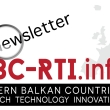Science and Research in Western Balkans | Some recent developments
30. Aug. 2016
The period March - July 2016 was marked by several relevant conferences and meetings related to science and research policy in Western Balkans. The last two issues of the WBC-RTI.info newsletter were therefore dedicated to the results and conclusions from two of those events: the 2nd Joint Science Conference of the Western Balkans Process (JSC-WBP) and to the conclusions of the 18th Steering Platform on Research for the Western Balkans. The summary is available below.
On May 22-24, 2016, the 2nd Joint Science Conference of the Western Balkans Process (JSC-WBP) was successfully organised in Vienna. It was co-organised by the Austrian Academy of Sciences and the German National Academy of Sciences, Leopoldina in cooperation with the Austrian Ministry for Europe, Integration and Foreign Affairs, the Austrian Ministry of Science, Research and Economy, the German Alexander von Humboldt Foundation and the PERFORM-platform (Performing and Responsive Social Sciences; funded by the Swiss Agency for Development and Cooperation Helvetas).
“The advancement of science systems in South East Europe is not only significant for countries of the Western Balkans but also for Europe,” underlines Anton Zeilinger, President of the Austrian Academy of Sciences: “Science is a central instigator for societal and economic development. Given that scientific knowledge and innovative ideas are not confined by national boundaries, high quality research in the Western Balkans also provides opportunities for all European countries.“
The Joint Statement, which was recently published and it is online available, includes five key recommendations that are to be taken into consideration by relevant national, regional and international stakeholders. The Joint Statement and its recommendations were also presented to political decision-makers who met at the “Western Balkans Summit” in Paris on July 4, 2016. The Joint Science Conference was mentioned in the final declaration of the Summit:
“The parties welcome the joint science conferences held in Berlin in 2015 and Vienna in 2016. They reiterate their recommendation to allocate sufficient funding to research, with 3% of national GDP as a target and ask the national academies of science to propose, by their next conference to be held in France in 2017, funding mechanisms for excellent young researchers from the Balkans, allowing them to gain experience abroad and to create their own laboratories of excellence.” (Final Declaration by the Chair of the Paris Western Balkans Summit)
Additionaly, WBC-RTI.info coordinator Ines Marinkovic spoke also with three conference participants from the region. Here are their messages:
- Interview with Prof. Nexhat Daci: “The Academies from the region will find a way to participate jointly in the projects and contribute to changes in the region.”
- Interview with Prof. Artan Puto: “Capacity building is important for the region; involvement of students and young researchers in projects from the very beginning is recommendable.”
- Interview with Prof. Vlado Matevski: “It is not sufficient to adopt good laws and other measures if they are not implemented in practice.”
Find further information on the Joint Science conference here. A selection of topic related events, news, calls, documents, organisations, links etc. is available here.
On June 7, 2016, the 18th meeting of the Steering Platform on Research for the Western Balkans was successfully organised in Sarajevo. It was co-chaired by the Regional Cooperation Council (RCC) and European Commission (DG Research and Innovation, Directorate on International Cooperation). "Open Science" was one of the topics discussed:
(...) As the study commissioned by the RCC revealed a lack of knowledge and information on the Open Access in the Balkan Region, the Dutch Presidency encouraged the Western Balkans to start as soon as possibly with awareness raising on the importance of Open Science. The OECD also underlined importance of awareness raising as a first step in applying the principles of Open Science and for this purpose referred to several best practices in the OECD countries which could serve as an example for the Western Balkans. (...)
The Steering Platform took note of the many and diverse actions taken by the Western Balkans all working on new or updated Strategies on Research, Science and or Innovation and committed to implement them in line with the European Research Area actions. Most expressed concern on low rate of successful participation in Horizon 2020 so far. (Please check also [Event Review] "Workshop for 'enlargement countries' (WBCs and Turkey) on EU acquis on Research and Innovation (chapter 25)")
Please follow this link to read all about 18th meeting of the Steering Platform and its conclusions.
Finally, during the SP Meeting, the Austrian Federal Ministry of Science, Research and Economy committed to support the continuation of the online Western Balkans Platform (WBC-RTI.info Platform) managed by the Centre for Social Innovation (ZSI) and in this way further support bi-regional dialogue on science, technology and innovation by benefiting from and interacting with the Steering Platform on Research for the Western Balkan countries.
Related Articles:
- Project: Information Platform | Western Balkan Countries | Research, Technology, Innovation
- News: WBC-RTI.info to support integration of WBC into ERA for the next 3 years
Tags: Balkan, Southeast Europe















































